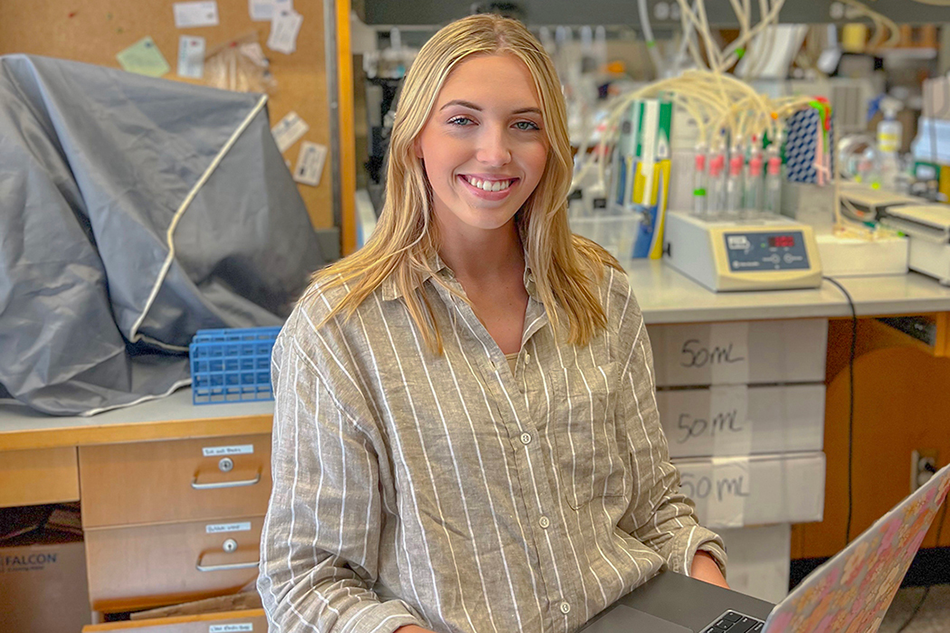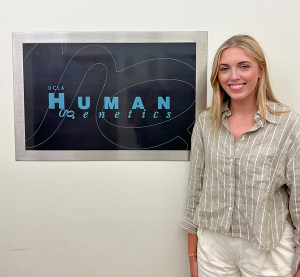
When Brooke Bowman chose the biological sciences degree program at the University of Missouri her focus was on getting into the medical field, with the goal of eventually becoming a doctor. However, the more time she spent in laboratories across campus, Bowman realized that her career may not be in the clinic. She had started to develop an interest in research.
That passion has connected Bowman with a variety of hands-on learning opportunities at Mizzou, as well as an exciting research program on the west coast this summer. Bowman is currently participating in the Bruins-In-Genomics (B.I.G.) program at UCLA. A summer research program focused on genomics and bioinformatics, Bowman is gaining valuable insight into how genetics ties to biological, biomedical and health sciences.
“This program is an incredible opportunity to explore interesting research and get an early look at what graduate school would potentially be like,” Bowman said. “I’m also excited to represent Mizzou throughout the experience. I want to show others that they want ‘Mizzou Made’ students in their programs.”
MU wasn’t originally on Bowman’s radar as she was making her college decision. She had already settled on attending a different university, but a family friend encouraged her to at least take a look at Mizzou. Bowman grew up in Hoyleton, Illinois, about an hour east of St. Louis.
It took just one campus tour and Bowman was ready to switch – she was going to be a Tiger.
“Once I arrived on campus, I immediately fell in love with it,” said Bowman, who will be a senior this fall. “Everyone was incredibly friendly, and it was so easy to envision myself at MU. I felt at home right away.”

The Honors College also played a big role in bringing Bowman to Mizzou. Her hometown has a population of approximately 500, and Bowman said the smaller class sizes offered through Honors sounded appealing.
“I really love that I have been able to build that small-town community through Honors,” said Bowman, who is also an anthropology minor. “It’s been very easy to form connections and find peers with shared interests, even on such a large campus. I became an ambassador because I wanted to share all the exciting opportunities within the Honors College, as well as how much I love Mizzou.”
Bowman’s interest in medicine began when she was young. Growing up, she had a handful of health issues that required multiple doctor visits. While she normally wasn’t a fan of those encounters, she did have an orthopaedist who left an impression on her.
“I was really afraid of going to the doctor, honestly,” Bowman said. “But my orthopaedist did a wonderful job of helping me through my injuries and health issues. He actually inspired me to go down the medical path.”
That interest led Bowman to biological sciences at Mizzou. Even though her college career began during the pandemic, she worked hard to find research opportunities early on.
“I started reaching out to professors immediately and was connected with a couple different projects,” Bowman said. “The first had us using M&M’s to teach people about statistical methods. I also helped as a lab manager during a COVID study where I reached out to patients who were getting vaccines.”
Those experiences led to Bowman landing a spot in the lab of Jared Decker, an associate professor in the Division of Animal Sciences. The Decker lab combines population genomics and quantitative genomics. Using population genomics, the group works to better understand the history of domestication, breed formation and selection in cattle. With quantitative genomics, the team creates new genetic and genomic predictions (DNA tests) to help farmers and ranchers select more profitable and sustainable beef herds.
Bowman also works closely with Elizabeth Bryda, a professor of veterinary pathobiology. Among several project areas, Bryda’s work centers on the generation and characterization of new animal models. They use a variety of evolving technologies, including CRISPR.
Bowman’s work centers on generation proxy selection mapping, which includes detecting polygenic selection within a population that has multiple generations of genotype data.
“Mizzou has showed me what being a scientist in the real-world is truly like,” Bowman said. “It was a big decision for me to switch career paths, but it really does make sense. I loved researching my family tree as a kid and am interested in where my family came from. I think a career tied to genetics sounds very exciting.”
Bowman will dive deeper into that focus area at UCLA. The Bruins-In-Genomics program will allow her a chance to interact with multiple professors, take in special events with professionals and participate in a research project.
“This has been such an exciting opportunity for me to expand on what I’ve learned at Mizzou,” Bowman said.
As Bowman finishes her undergraduate degree, she said she is planning to attend graduate school and continue to study genetics. She would like to eventually work with for a personal genetics company, like 23 and Me.
“I still want to help others, and a company of this nature connects people with their roots, as well as highlights any potential health dispositions,” Bowman said. “I love being on the cutting edge of research. I really appreciate that MU has allowed me to do that – and I’m ready to take what I’ve learned and apply it.”